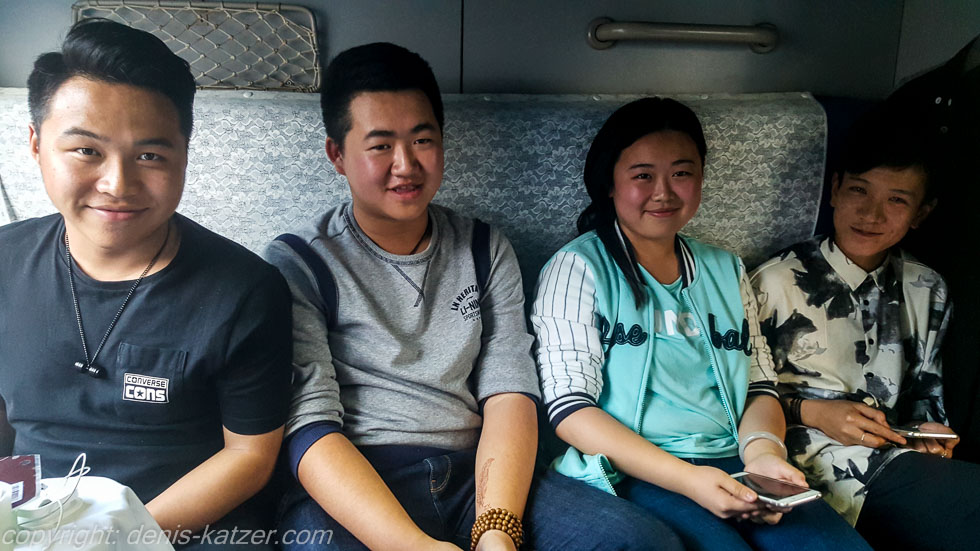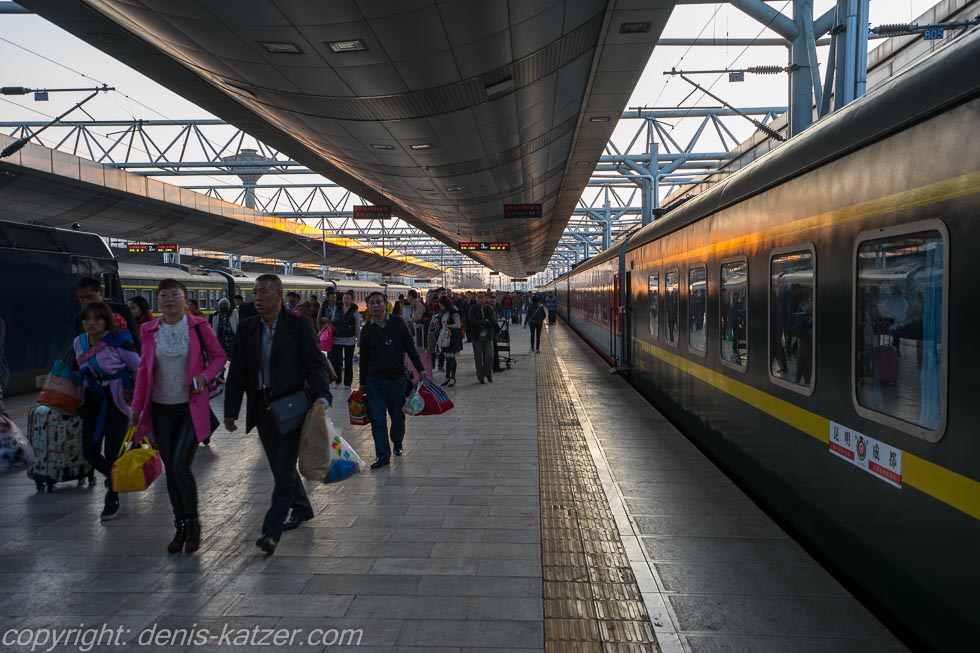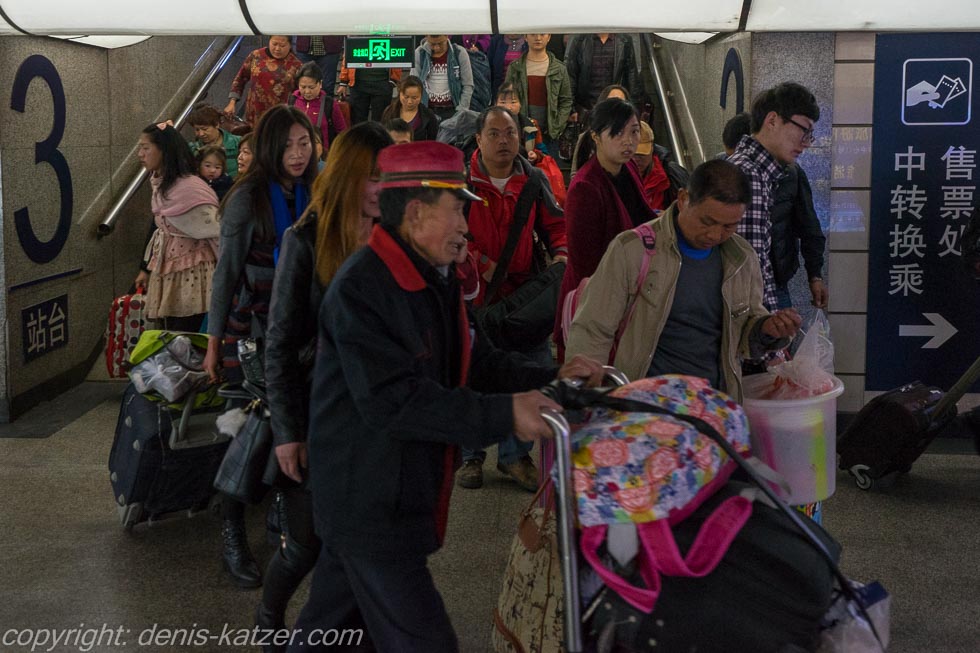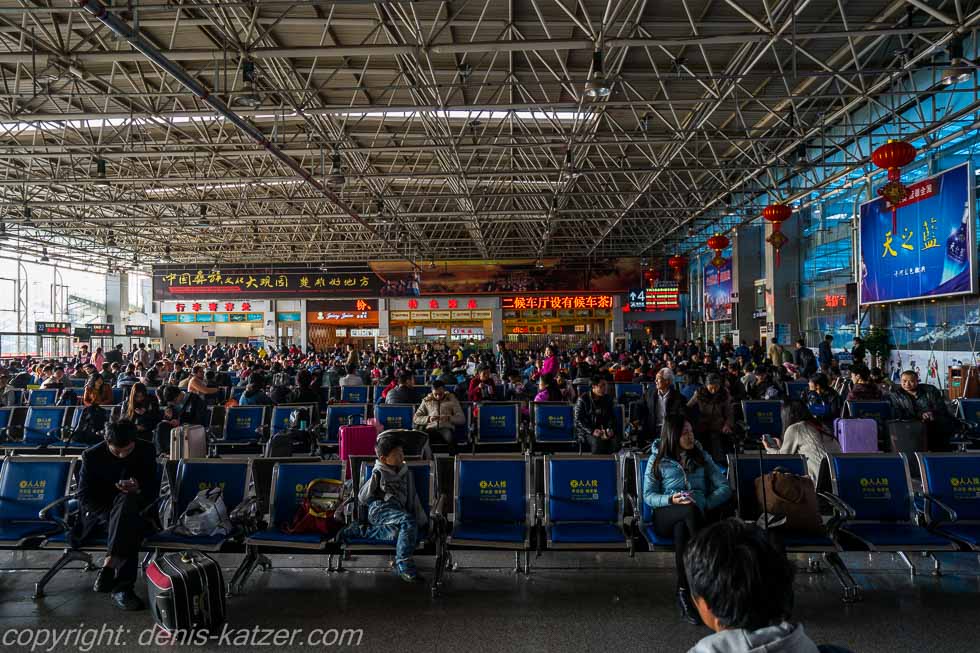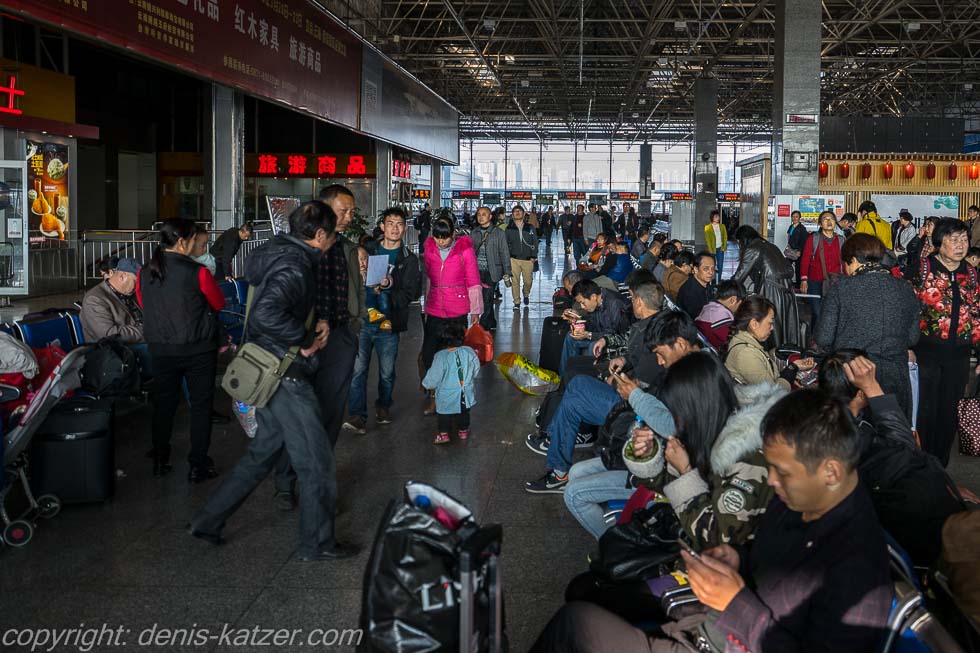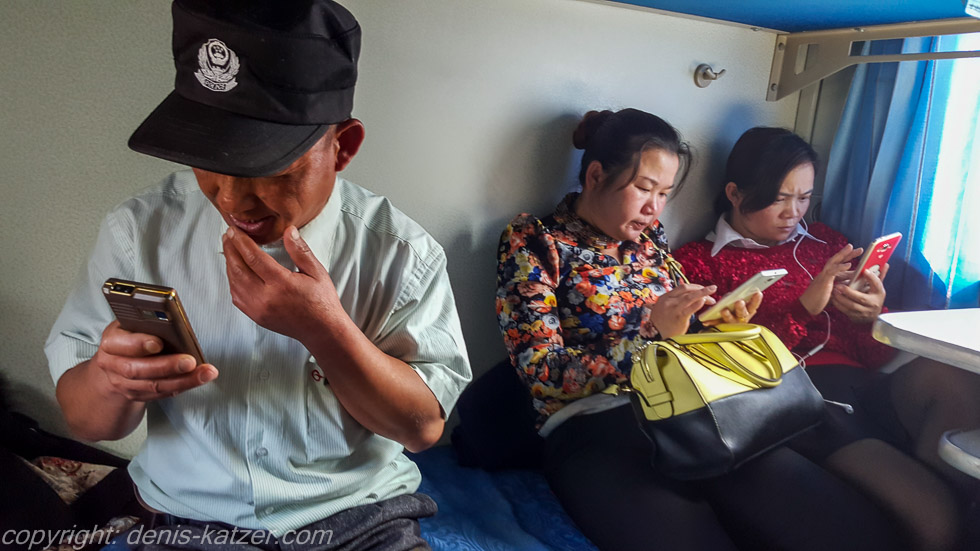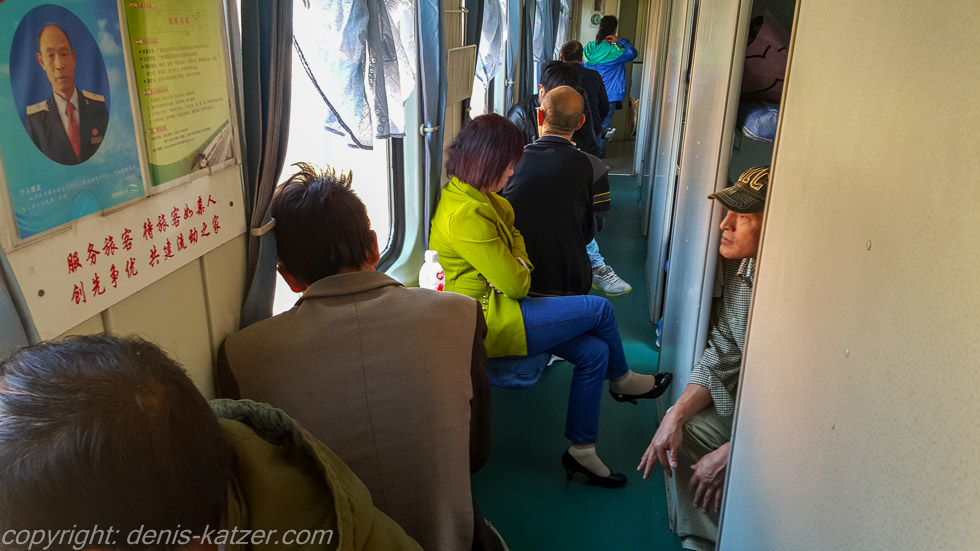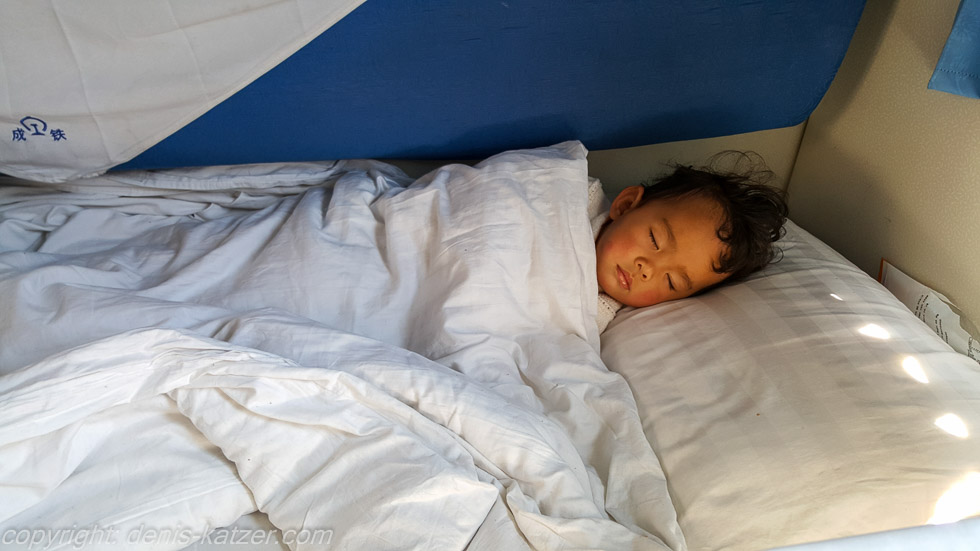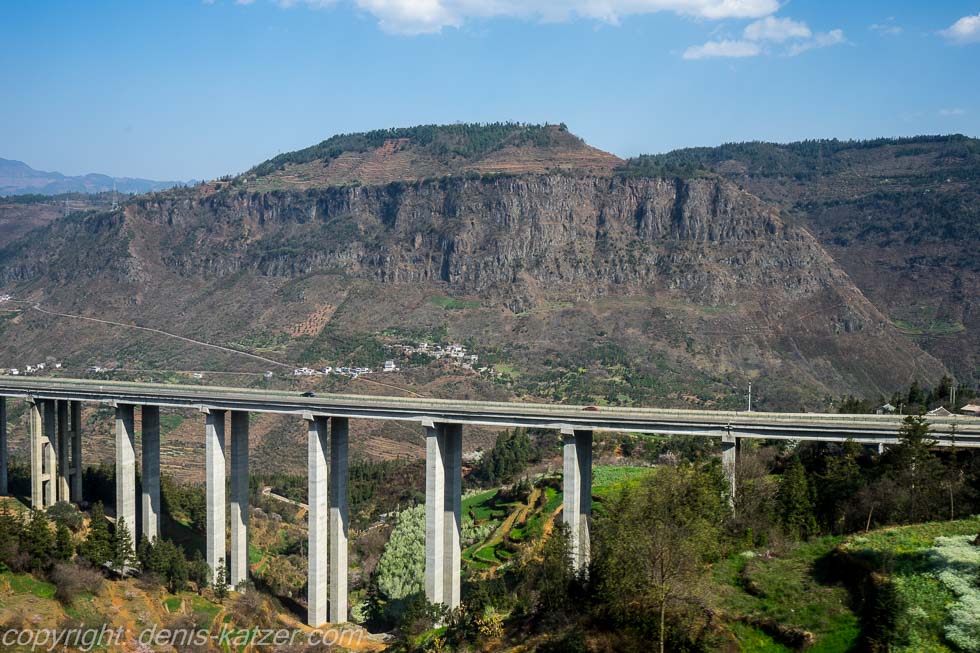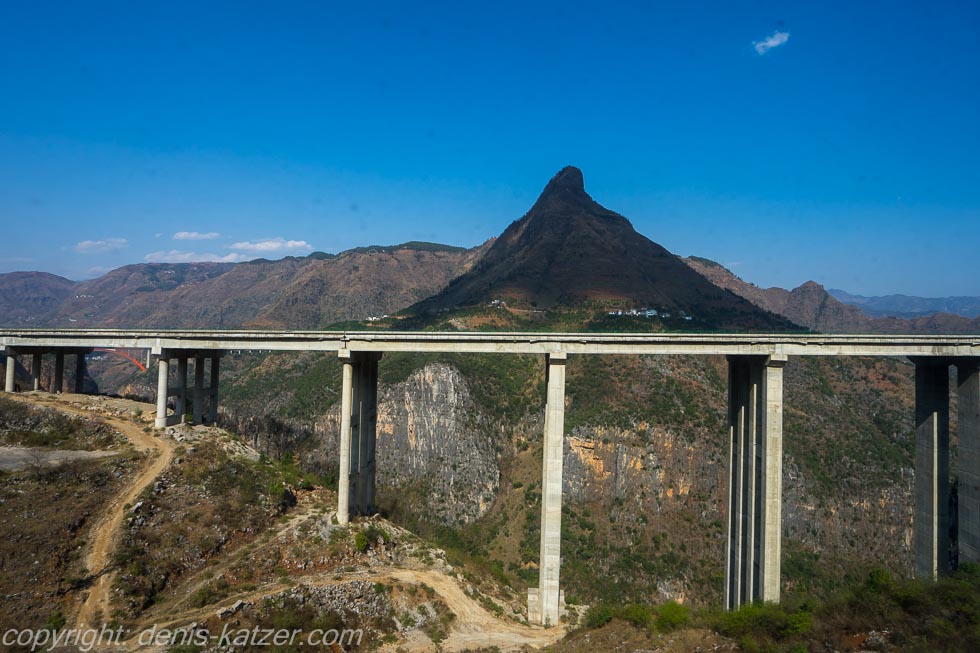
A grueling, breathtaking train journey and tricky border crossing
N 30°40'51.0'' E 104°03'23.2''
Date:
06.03.2016 until 09.03.2016
Day: 251 – 254
Country:
China – Vietnam
Province:
Sichuan – Yunan
Location:
City of Chengdu – City of Lao Cai
Latitude N: City of Chengdu
30°40’51.0”
Longitude E: City of Chengdu
104°03’23.2”
Daily kilometers:
3,000 km train journey to Vietnam and back
Total kilometers of the e-bike expedition:
15,819 km
Soil condition:
Rail
Maximum height:
500 m
Total altitude meters of the e-bike expedition:
25.392 m
Sunrise:
07:25 am – 07:21 am
Sunset:
7:05 pm – 7:07 pm
Temperature day max:
27°C
Temperature day min:
12°C
(Photos of the diary entry can be found at the end of the text).
After Tanja’s trip to Vietnam, we are very happy to see her again. During a walk in the park, she tells me about her experiences in detail. Then we prepare for my border trip tomorrow. So that I don’t get lost during my train journey, she writes me a detailed plan. They even finished a drawing of the Chinese-Vietnamese border.
“I’ll walk you to the station,” says Tanja when the time comes. “Great,” I say happily. When we arrive by bus at Chengdu Central Station, the hustle and bustle is indescribable. Because I have been living in our quiet neighborhood for days, the inhuman noise hits me as if I had run into a concrete wall. Loudspeakers blare out their incessantly repeated offers and requests to buy from the countless stores. Thousands of people are swarming around. “You have to watch out for pickpockets. It’s best to put your new smartphone in your breast pocket,” Tanja warns me, as my last smartphone was stolen at a bus stop in Ulan Bator. Since she raved about fritters with ketchup before she left, we go to the same place to satisfy my appetite. Then she takes me to the entrance of the large station. With Tanja’s description in hand, I find my way around very well and a little later I’m on the same train as she was a few days ago. I quickly find my sleeping compartment, put my small rucksack on the lower bunk and sit down next to it. “You can enjoy the ride, you have a bed to yourself. The other passengers won’t sit on it. Everyone goes straight to the berth they’ve booked,” said Tanja. “Phew,” I groan with relief, settling down on my clean bed for the next 19 hours. As soon as I’ve made myself comfortable, a slightly chubby, completely sweaty and out of breath teenager bursts in. Ignoring me, he throws his suitcase and a large plastic bag stuffed with sweets onto the bed opposite me, sits down on it and smears his sweaty face on the freshly covered pillow. Then he unwraps a chocolate bar, bites into it and washes it down with a Coke. Suddenly he jumps up and turns the compartment’s loudspeaker switch to full blast. A shrill Chinese female voice rattles out of the loudspeaker. It sounds just like the one in front of the many stores at the station. The peace and quiet we had just enjoyed is permanently dispelled. The buxom boy plops back down on the bed, peels one of the awful-tasting ready-made deserts out of its plastic wrapping and shoves it into his mouth, chewing quickly like a rabbit. Only a few minutes pass when another boy, this time spindly, puffs into the compartment as if he had just climbed to the top of Mount Everest. He moans so much that at first I’m worried he might collapse from circulatory failure at any moment. He now also settles down next to his buddy on the bench. I am startled when his shy gaze briefly touches me. “The poor guy is blind,” it goes through my head. However, he behaves like a sighted person. Then I notice that he is wearing colored contact lenses that give him the frightening look of an alien. With further loud moaning and a conversation that is more reminiscent of typical Chinese shouting, the two of them put their luggage on the shelf above the beds. As soon as this happens, they hurry out of the compartment, leaving behind a frightened foreigner. I take my chance and turn the loudspeaker control down again. Phew, at least the bellowing of that awful female voice is more bearable now. It’s not that I’ve suddenly become sensitive to noise, but too much is just too much. As soon as I sit back down on my lovely bed, the two adolescent men storm into the compartment again, plop down on their berth like ill-bred rascals, reach into the bag of terribly unhealthy snacks and open a bag of potato chips. Smacking loudly, as if several pigs were eating from a large trough, they devour the nibbles with their mouths wide open. They are just about to open a packet of sweets when another Chinese man enters our train compartment, shouting loudly. “He must be the boss of the horror troupe,” I think to myself, because he’s acting like a little gorilla courting his harem. The only thing missing is him drumming his fist on his chest. The three of them are now sitting opposite me, shouting as if they have to shout something at each other from a great distance, eating sweets and another bag of potato chips. So far, none of them have looked at me, let alone registered. I just don’t seem to be there. Maybe I ended up in a Harry Potter movie and accidentally put on Harry’s cloak that makes me invisible? Anyway, I watch my compartment mates, who have now started playing cards to the sound of booming laughter. It jolts a few times, then the iron snake starts moving towards the city of Kunming. Suddenly a girl, about the same age as the boys, sticks her head into the compartment. The shouting increases. As there is hardly any room on the teenagers’ bench, she simply sits on my sleeping area. “The Chinese always go to their booked bed. Enjoy the ride,” Tanja’s words run through my head. As I am a foreigner and took the last train in this country about 20 years ago, I don’t know how to behave. I decide to continue playing the withdrawn observer. Suddenly, the four of them interrupt the card game and pull out their smartphones to continue playing or watch movies without headphones. The resulting Chinese sound salad almost bursts my eardrums. None of the young people devotes more than five minutes to each activity. But that’s not all, while they are constantly looking at their displays, they are also playing cards, chatting, cracking jokes, eating potato chips, chocolate, cheap sausages and drinking from a large bottle of Coke together. I sit there stunned and think I’ve landed on another planet. If this is the generation of tomorrow, then I can only feel sorry for China. The decadence here, right before my eyes, crosses all boundaries. In the meantime, two of my compartment mates have already made themselves comfortable on my bed. Sure, it’s better to play when you’re sitting opposite each other. Then, as if someone had given them a command, they jump up, giggling loudly, and storm out of the coupe. Again, I take the opportunity to lie down on my bed so that I can at least secure my paid area. The gang of four rushes back in a few minutes later. As my berth is now obviously occupied by myself, they squeeze onto the bench opposite, laughing loudly. Even if the noise, nattering and playing continues unchanged, I have at least stood my ground a little now. Surprisingly, after the two-hour train journey so far, none of the four of them have given me a single glance. Despite the noise, I have the opportunity to enjoy the scenery on the most important transport route in southwest China from Chengdu to Kunming.
It is 6 p.m. when, after five hours, I break the silence between my fellow travelers and myself. As I have discovered that the person I have declared to be the leader of the group speaks quite good English, communication is easier than I thought. Heshu is not a rutting gorilla teenager, but a very nice one. The behavior of the four is certainly due to their upbringing. As rich only children, they were treated like little princes by their parents and most likely rarely reprimanded. I also notice time and again that many Chinese people are initially quite shy and timid towards foreigners. Perhaps one reason why the four of them tried not to register me as a living being. After a few minutes of conversation, Heshu thaws out and reports that he is the son of a mayor. “My fellow students also come from rich families. The slightly fatter one is the son of very wealthy parents who have become multi-millionaires by buying and selling high-rise buildings. Although business hasn’t been going so well for a year now,” he explains. “And what did you do in Chengdu?” I ask. “We were in the city to apply to an elite university.” “What do you want to study?” “Journalism.” “So, have you been accepted?” I want to know. “Just me, the others all failed. But I’m not surprised. They don’t bother, they’d rather play around with their cell phones than actually study. It doesn’t bother them too much because their parents are rich,” he explains somewhat condescendingly. “I’ve heard you have to study many hours a day and have hardly any free time, is that right? “Yes, studying in China is inhumane. We have to sit in the empty classroom from 6:00 am to 9:00 pm. Every day. Only on Sunday do we get half a day off.” “Oh dear, that sounds really inhumane. Do you even get anything in your head in the evening? After so many hours, you must be dead tired, right?” “Not really, but we still can’t miss work. We drag ourselves to lectures even when we’re ill. We have to take lots of exams to get ahead. The pressure is immense. Students take their own lives again and again. There were five at my university last year.” “Five of your fellow students took their own lives?” I ask, because I don’t think I’ve heard correctly. “Yes, students die in China’s universities every year. There are many of them. They can’t cope with the stress and decide to commit suicide. For some, it’s the only way to escape the constant overload. The problem is that in China you are nothing without a successful degree. You are worth nothing and can hardly earn any money. Parents often put everything they have into their children so that they become something. That is their only real purpose in life. I am very, very grateful to my parents for what they have done for me.” “Your father must be very proud of you if you were one of the few to be accepted to an elite university?” “Oh yes, he is. To motivate me, he gave me a Ford Mustang for my 18th birthday.” “So your parents are rich too?” “They’re not rich.” “Well, who gets a Ford Mustang for their birthday? You have to have money,” I reply. “Yes, yes, we can’t complain, but money isn’t everything,” his statement amazes me. As a result, we spend the next few hours talking animatedly about China, the destruction of the environment and corruption.
“Twenty years ago, our rivers were still clean. Countless fish lived in them. Today they are completely contaminated. They are either yellow, brown, black or green. Depending on what the industry dumps into them,” his frank words surprise me. “Unfortunately, we can’t do anything about it. Industry is destroying our beautiful China and the government is watching or participating. It will always be like this.” “It won’t always be like this. Things change. You are the young generation. You can make a difference,” I try to encourage him. “But how? Everything is controlled. They have far too much power,” he replies. “Look at the history of China. As far as I know, there were 18 different dynasties. None of the ruling families has lasted forever. Every government comes to an end and is replaced by new governments and political parties. Nothing lasts forever in this world. So something will change for you too. Think about what China has created in twenty years. In the first half of the 20th century, your country was still considered the poorest in the world and now it is one of the richest,” I say. “True, but we won’t stay rich if we sacrifice our environment.” “I agree with you on that. There is an absolute need for action and the way things are in this country, there is not much time left. I hope for the sake of your generation and Mother Earth that China can turn things around in time. As far as I know, the first emission-free coal-fired power plant has been connected to the grid in China. This means that it no longer produces harmful exhaust gases. The Chinese government has realized that things can’t go on like this and is investing a lot of money in research into environmentally friendly energy generation. For example, there are infinitely large solar parks in Inner Mongolia. I saw that with my own eyes. In Chongqing, a city of 30 million people, one of the largest theater buildings in the world is heated or cooled by running water from the great Yangtze River through heat exchangers. This works so well that there are plans to use this fantastic technology for residential buildings in the future. This would reduce pollutant emissions enormously. China is working hard to go green and who knows, maybe you will become one of the cleanest countries in the world in the future?” “Yes, that would be a wonderful idea,” Heshu replies, smiling at me.
Heshu and the girl sleep in another compartment and leave us at 22:00. The playing comes to an end and peace and quiet sets in. I slip under my comforter and fall into a deep sleep. When we reach Kunming at 7:30 am the next day, after a 1,100 km train journey, crossing the great rivers Min Jiang, Qingyi Jiang, Dadu He and Jinsha Jaing and the Hengduan Shan mountains, the south-eastern Tibetan highlands, Heshu helps me to buy another train ticket to the city of He Kou, on the Vietnamese border. But the queue in front of the many counters is so long that Heshu has to leave me so as not to miss his own connection. “I wish you every success with your studies,” I say. “Thank you, and good luck and good health on your fantastic travels,” he replies and disappears into the crowd. After 30 minutes I am finally at the counter. “A ticket to He Kou,” I say and am about to hand the woman behind the glass a piece of paper with my wish written on it in Chinese. I don’t even get to stretch out my hand when I hear the word sorry and a blind closes right before my eyes. “What’s that all about?” I ask, not wanting to believe my eyes. I stand there dumbfounded and don’t know what to do now. If the situation weren’t so absurd, it would be hilarious. Because the 30-meter-long queue of people behind me remains stoic, this seems to happen more often. To our left and right there are a total of 25 other counters where long queues of people are also waiting patiently. If I leave my position now to get back in line, my connection could be tight. Curious, I try to look between the individual slats of the blinds to see what is going on behind them. I look nervously at my watch. Another 45 minutes until departure. After another 15 minutes, the viewing grid suddenly lifts. Another woman is sitting there and asks me where I want to go in English. Relieved, I hand her the money and receive my ticket.
20 minutes later I’m sitting in a hard sleeper compartment. As the train journey from Kunming to He Kou only takes around 6 to 7 hours, depending on the connection, this is a cheaper option than traveling in a soft sleeper compartment. However, six passengers share a compartment in the hard sleeper, which also has no door and is open to the aisle. Also, as the name hard sleeper suggests, the seats are hard and uncomfortable. Anyway, in this class the chances of getting in touch with the normal Chinese people are higher. So it happens that I find myself on a crowded train next to an old woman who, judging by her smell, hasn’t washed for many weeks. Every time she moves, a pungent vapor rises into my nose that is almost unbearable. The other compartment occupants don’t seem to mind much, at least I can’t see any signs of discomfort from them. As if their lives depended on it, they are busy with their cell phones and smartphones during the entire journey. The narrow corridor right next to me is constantly busy. Passengers meander back and forth between the many fold-out seats on which other passengers have made themselves comfortable. They drag their suitcases or plastic bags behind them with strength and skill. A salesman is shouting. He wants to sell the latest technical achievement of a razor. To show how robust and indestructible his razors are, he presses the shaving blade onto a metal tray. Then he asks the crowd who would like to be shaved by him. An old man nods his head stolidly. The salesman immediately jumps up and roughly shaves off his stubble. The old man has no money but another fellow traveler is now convinced of the quality of the razor and buys the part, which is certainly cheaper on the street.
I look out of the window and, as so often in China, can hardly believe what I see. Although I’m only in here so that I can re-enter the country with a new visa, this train journey is breathtaking, I would even say an absolute highlight. It is a masterpiece of engineering and shows what the Chinese are capable of. The railroad winds its way across an alpine landscape, not through its valleys, but, it seems to me, to the top of the mountains. At an altitude of over a thousand meters, we cross numerous bridges and tunnels. Sometimes I feel like I’m not sitting on a train, but in a subway. The construction workers have drilled hundreds of kilometers through the mountain peaks like voles, so that it is often dark in our compartment and I only occasionally get to see some of the fantastic mountain landscape. It looks like it won’t be long before the Chinese have completed one of the largest railroad projects in the world and travelers will be able to travel along the 5,500-kilometre trans-Asian route from Kunming via Myanmar, Thailand, Vietnam, Cambodia and Malaysia to Singapore.
When we arrive in the border town of He Kou in the late afternoon, I leave the train relieved, despite the view of the sometimes breathtaking mountain landscape. “You have to take a cab to the border here,” Tanja advised me. In the hustle and bustle of passengers being spat out of the train, I squeeze into an old, rusty crate with four other passengers. The driver speeds off like a madman, breaks through deep holes in the broken road like a kamikaze and disregards almost all traffic rules. One after the other, he drops his customers off at various locations in the city. As I am no longer sure whether he is really driving me to the border, I show him my note again, which says “Border to Vietnam” in Chinese. He laughs out loud, hits his horn with his fist to scare the hell out of a rickshaw driver, laughs out loud again and takes a bend with screeching tires. “I wouldn’t want to meet a cyclist like that,” I think and hope to arrive safely. He actually stops in front of the bridge which, according to Tanja’s plan, leads across the Honghe River to Vietnam.
There are only a few people at the Chinese passport office. Before I know it, I get my exit stamp and leave the building via the stairs. When I reach the bottom, I wonder why I shouldn’t enter China again straight away? I would only have to go back into the building and present my second passport with the new visa. However, I am being watched by a Chinese armed guard and don’t dare turn back in front of him. That would certainly look strange to him. Why would someone leave China without going to Vietnam and enter the country again? So I greet the man and walk across the bridge to the Vietnamese border in wonderful sunshine and pleasant temperatures. I join a small queue of people and ask myself what I’m doing here while I wait. “I’m driven by fear,” it goes through my head. “Why shouldn’t I just turn around and re-enter China? Tanja said that the Chinese didn’t even look for the Vietnamese exit stamp when they entered the country.” I give myself an inner jolt and leave the queue to go back over the bridge. To avoid attracting attention, I turn my cap inside out and put on a jacket despite the warm temperatures. Since I know that it’s not easy for the Chinese to tell us Europeans apart, I hope that the guard won’t recognize me straight away. I actually walk past him without being noticed. I enter the border building with a queasy feeling. I am the only traveler at this hour. A Chinese official greets me in a friendly manner and helps me to fill out the entry form. “Passport control is over there,” he says in English. “Xie xie,” I say thank you. “Ni hao,” I greet the officer from behind her glass window. “Do you speak Chinese?” she asks. “No, just a few words,” I reply as she looks at my passport. “Why are you traveling to China?” she now wants to know. “Business, I’m writing a book about your country,” I answer truthfully. “Oh, that’s nice,” she says, taking the stamp in her hand, and as she is about to slip it into her passport, she suddenly stops and starts leafing through it. “Oh no. What if she can’t find an exit stamp from Vietnam?” my mental movie makes me nervous. After an endless while, at least that’s how it seems to me, she looks up with a furrowed brow and asks: “Where have you just come from?” “From China,” I say. “From China?” “Yes, from China. I left on the second floor and came back here on the first floor,” I explain as casually as possible. “But… how can they leave and re-enter the country? Where is the visa you were in my country with? I can’t find it here in your passport.” “It’s not in there either,” I admit. “I have two passports. Look,” I say and hand her my other passport with the expired visa. “Well that’s strange,” she says and now examines the two passports with the help of her colleague. “Hm, everything seems to be fine,” I hear her words of relief after another five minutes. “But you can’t just leave China and enter again straight away. They have to go to Vietnam first. Once they have their exit stamp in their passport from there, they can re-enter our country,” she says. “Okay,” I reply kindly. “See you soon then,” I quickly say goodbye as an officer with lots of stars on his shoulder enters the building and hurries purposefully towards us. “Ni hao,” I greet him and try to walk past him as calmly as possible. I am of course aware that my papers are absolutely in order, but you never know what officials will come up with. That’s why I make a quick getaway. 200 meters further on, I hand the Vietnamese passport officer my travel document. “But you have a beautiful watch. Do you want to sell it to me?” I’m taken aback by his question. “Sorry, but I need them quite urgently myself,” I reply with a smile. A colleague of his strolls over, grabs my left arm and looks at the watch. “Yes, it really is a beautiful watch. And you really don’t want to sell it to us?” “Sorry, but I need it myself. What’s a man without a watch?” I joke. “You can buy a new one then.” “Thank you, thank you, but I prefer my old watch,” I laugh. Tock, tock, the stamp rushes into my passport. I say goodbye and stand a few meters away on the stairs of the building. “Do you need a cab or something else?” I am immediately asked by a civilian who obviously specializes in doing business with inexperienced new arrivals. I wave it off. “Why should I take a hotel room here only to enter China again tomorrow? That’s a complete waste of time,” it flashes through my head again, although my common sense tells me not to stand in front of the Chinese official again. “Always this fucking fear,” I revolt, turn on my heel and re-enter the Vietnamese border building. The entry counter is located just 20 meters from the exit counter. I hand the officer my passport with which I have just entered the country. This official also pauses for a moment when he notices the Vietnamese entry stamp from today. “Do you have a visa for China?” he asks, leafing through the passport. “Yes.” “But that’s expired,” he replies. “I have another passport with a valid visa. Here you see,” I say and hand him the second passport. “You have two passports?” he says, takes them both and disappears. Moments later, he reappears with his colleague. It’s the man who just wanted to buy my watch. “Why do you have two passports?” “Because I’m a travel journalist and constantly need visas. Sometimes, as in this case, the application times overlap,” I explain. “Very clever,” says the watch buyer with a grin and stamps my passport.
Not relieved for the first time that afternoon, I set off for China again and cross the bridge. “Here I am again,” I say as I stand in front of the Chinese official once more. She immediately checks my departure from Vietnam. She smiles contentedly, picks up the stamp and… suddenly stops. “Oh no, what’s going on now?” an anxious question flashes through my mind. “Why do you have two passports?” “Because I travel a lot for work and always have to apply for visas while I’m still abroad,” I reply, to which she nods and finally stamps my passport. “Zaijian,” I say goodbye. “Zaijian,” she says kindly.
At 22:30, I’m back on the train from He Kou to Kunming. On the morning of the next day, a well-dressed Chinese man speaks to me in English. He spent the night with me in the same hard sleeper. We immediately hit it off and he accompanies me to the ticket counter to help me buy the connecting ticket from Kunming to Chengdu. Afterwards, we sit in one of the many fast food outlets and talk about life. “I’ve just come from Cambodia. We’re building a bridge there,” he says. “So you’re a bridge engineer?” “Yes, that’s my job. I build bridges everywhere, even abroad. I’ve been doing it for eight years, but it’s getting boring. When I’ve saved up enough money, I’ll become a teacher.” “Teacher? Why is that?” “I enjoy passing on my knowledge. I find the teaching profession fascinating. I won’t do it to earn money, but because it gives me inner satisfaction. I’m quite sure of that. Above all, I want to be with my family. Out of 365 days a year, I spend between 320 and 340 days on the road. Last year, I took a hundred flights alone and that doesn’t even include bus and train journeys. My wife and I had our second child six weeks ago. I saw my daughter shortly after she was born and now I’m happy to see how she’s grown,” he says. “That’s terrible. What’s the point of all that money if you don’t live properly and don’t see your own children grow up?” I ask. “I think that all the time too. That’s one reason why I want to become a teacher. However, I have to feed the whole family on my salary. Even if someone gets sick, I have to pay the doctors or even a stay in hospital. That can be very, very expensive. You need large reserves of money for that. We don’t have a welfare state like you do in Germany. Here you have to pay or you die. Apart from that, money is the most important thing for us Chinese. Without it, you’re worth nothing. Everyone strives for it. In our history, people have often not fared well. That’s probably why everyone chases after money and forgets about their lives.” “Seems kind of familiar. I was with the children of rich businessmen on the outward journey to He Kou. They told me they didn’t see their parents too often. And to be honest, the result of their upbringing was a disaster.” “What kind of business did the parents of these kids do?” asks Guo. “One was mayor and the others made their fortunes buying and selling tower blocks.” “Oh, that really was a damn good business until recently.” “Why until recently?” “Because we’ve built up a real estate bubble in China. There is much more living space than we need. Many of our high-rise buildings are empty. We call them ghost houses.” “Ghost houses?” I wonder. “Yes, we call them ghost houses because no one will live in them. There are whole districts of such ghost houses. They are only built for speculative reasons and are sometimes not even finished properly. Everyone makes money, the concrete seller, all the companies that put their tradesmen and workers there, the builder who ends up selling the building to investors at a price they can hear, who then sell the building on at an even higher price.” “And what if they can no longer sell it on? Isn’t there an end in sight at some point?” “Yes, when the time comes, the real estate bubble will burst and everyone will go bankrupt. But our president has a fabulous idea. We have the know-how and the construction machinery. We’ll sell our knowledge and workers abroad and cover the whole world with our highways and railroad networks. We are already building a railroad line from China to Singapore. Asia is big. We can still expand a lot there. Then we’ll go to Africa and Europe and so on,” he explains. “Wow,” I reply and am about to ask more questions when Guo suddenly jumps up. “What a bummer. I missed my connecting train. The conversation was so interesting for me that I didn’t look at my watch.” “I’m sorry about that.” “No problem, I’ll take the bus. It’s quicker anyway,” he says, shakes my hand and disappears into the crowd.
The return journey from Kunming to Chengdu is very relaxed compared to the outward journey. I share the four-person compartment with a young mother and her lovely baby, who doesn’t cry or scream once during the twenty-hour journey. From my seat, I enjoy the peaceful symbiosis between a caring, loving mother and her child. In the evening, I go to the dining car and enjoy a decent meal and a bottle of bad-tasting beer while gazing at the fabulously beautiful high landscape and its mighty mountains and gorges. I marvel at the seemingly endless terraced fields and catch a glimpse of the farmers diligently planting, watering and harvesting, thus helping to feed a population of billions. Even if this train journey was purely for practical reasons, I wouldn’t want to have missed it. It gives me a glimpse into a China that I wouldn’t have experienced by bike…
If you would like to find out more about our adventures, you can find our books under this link.
The live coverage is supported by the companies Gesat GmbH: www.gesat.com and roda computer GmbH http://roda-computer.com/ The satellite telephone Explorer 300 from Gesat and the rugged notebook Pegasus RP9 from Roda are the pillars of the transmission.
